

La Relève et La Peste. C’est une découverte scientifique majeure.
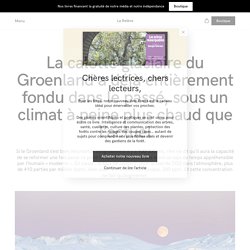
Une récente étude de carottes de glace révèle que la calotte glaciaire du Groenland a déjà entièrement fondu au moins une fois au cours du dernier million d’années, sous des températures à peine plus élevées que celles d’aujourd’hui. Cette avancée scientifique nous confirme que nous sommes désormais proche d’un point de bascule pour l’intégrité de la calotte groenlandaise, qui se situe probablement entre 1.5 et 2.5°C de réchauffement.
Ces nouveaux résultats renforcent l’importance de limiter le réchauffement anthropique en-dessous de 2°C par rapport à la période préindustrielle. Et même en deçà de 1.5°C si l’on veut limiter le risque de fonte du Groenland, qui représente une hausse de 6 m du niveau marin et pourrait impacter dramatiquement la vie de millions de personnes sur les littoraux. La moitié des puits de carbone pourraient bientôt relâcher plus de CO2 qu’ils n’en capturent. « Les écosystèmes absorbent environ 30 % de l’ensemble du carbone que nous émettons, donc s’ils ne jouent plus ce rôle cela pourrait entraîner une sorte de fuite en avant en matière de réchauffement climatique.

Cela créerait une boucle de rétroaction : les plantes captent moins de carbone, donc une quantité plus importante de carbone est relâchée dans l’atmosphère, ce qui accélère le réchauffement, et ainsi de suite », explique Katharyn A. Duffy, co-autrice de l’étude, au magazine britannique New Scientist. Pour parvenir à ces observations, la post-doctorante de l’université Northern Arizona et ses collègues ont conçu un modèle permettant de prédire les réponses locales à un changement des températures de l’ensemble des espèces végétales recensées à ce jour.
La crise climatique est pire que vous ne pouvez l'imaginer. Voici ce qui se passera si vous essayez - 25/01/2021. The climate science behind this year's wildfires and powerful storms - 60 Minutes. At least 31 have died in the largest wildfires in California history.

60 Minutes, The Guardian, and game-changing new climate science. On Sunday night, America met Michael Mann on 60 Minutes, one of the country’s most watched and influential television news programs for nearly 50 years now.
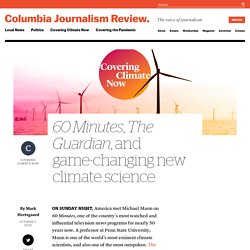
A professor at Penn State University, Mann is one of the world’s most eminent climate scientists, and also one of the most outspoken. The 60 Minutes segment, titled “Cause And Effect,” focused on climate change and California’s ongoing record wildfires, which have burned more than 4 million acres to date. Many Scientists Now Say Global Warming Could Stop Relatively Quickly After Emissions Go to Zero - Inside Climate News. Parts of the world economy may have been on pause during 2020, dampening greenhouse gas emissions for a while.
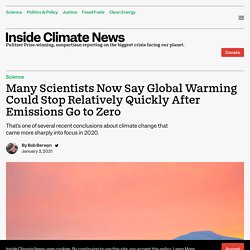
But that didn’t slow the overall buildup of atmospheric carbon dioxide, which reached its highest level in millions of years. If anything, research during the year showed global warming is accelerating. The end of the Arctic as we know it. The demise of an entire ocean is almost too enormous to grasp, but as the expedition sails deeper into the Arctic, the colossal processes of breakdown are increasingly evident.

The first fragment of ice appears off the starboard bow a few miles before the 79th parallel in the Fram strait, which lies between Greenland and the Norwegian archipelago of Svalbard. The solitary floe is soon followed by another, then another, then clusters, then swarms, then entire fields of white crazy paving that stretch to the horizon. From deck level it is a stunning sight. L'état du monde en chiffres. « Aujourd'hui, l'état dans lequel se trouve la Terre est, à bien des égards, bien plus effroyable que ce que je pouvais imaginer.

Il ne s'agit plus d'une projection vers un devenir potentiellement instable mais d'une instabilité planétaire actée, ici et maintenant » indique Aurélia, l'auteure de ce document. Réparti en 10 chapitres, les chiffres, issus de rapports scientifiques, défilent, alarmants. Quelques exemples ? Le document d'Aurélia, que nous remercions chaleureusement pour ce travail, est disponible en téléchargement ci-dessous.
Nous vous invitons à le partager autour de vous, sur les réseaux... Les meilleures sources sur l'Environnement et le Climat, tous niveaux confondus ! Quand les arbres meurent dans l’indifférence. À moins d’avoir les yeux braqués sur le compteur kilométrique, impossible de ne pas remarquer les arbres morts qui bordent l’A6, pour ne citer qu’un exemple frappant de la grande hécatombe qui touche les forêts un peu partout en Europe.

Déjà durement touchés par un été 2019 historiquement sec et caniculaire, nos arbres succombent à un rythme alarmant, épuisés par des bouleversements climatiques auxquels ils ne sont pas préparés. Et comme un malheur n’arrive jamais seul, ceux qui ne meurent pas de soif sont attaqués par des parasites comme le chancre ou le scolyte qui prolifèrent sur ces hôtes fragilisés. Sans titre. Akkas Ali, 48, had already been through a bad flood.
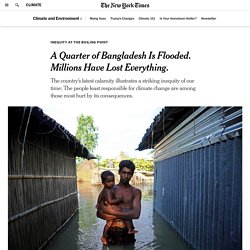
He moved to Mr. Islam’s village six years ago, when his old village washed into the Brahmaputra. Sans titre. Sans titre. Photograph Source: Steve Jurvetson – CC BY 2.0.
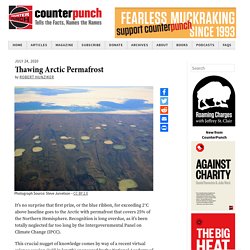
Sans titre. Sans titre. MOSCOW -- The Arctic is feverish and on fire — at least parts of it are. And that’s got scientists worried about what it means for the rest of the world. The thermometer hit a likely record of 38 degrees Celsius (100.4 degrees Fahrenheit) in the Russian Arctic town of Verkhoyansk on Saturday, a temperature that would be a fever for a person — but this is Siberia, known for being frozen. Sans titre. This dataset provides observations of atmospheric methane (CH4) amounts obtained from observations collected by several current and historical satellite instruments. Methane is a naturally occurring Greenhouse Gas (GHG), but one whose abundance has been increased substantially above its pre-industrial value of some 720 ppb by human activities, primarily because of agricultural emissions (e.g., rice production, ruminants) and fossil fuel production and use.
A clear annual cycle is largely due to seasonal wetland emissions. Sans titre. Dire Warning The global ecosystem is in far greater danger than scientists previously thought, according to a new study — and that’s really saying something. The research predicts that without dire action to reverse global climate change, entire ocean ecosystems could suddenly collapse this decade, The Guardian reports. It’s a dire warning: as various organisms face temperatures higher than anything they have before, the study predicts sudden, massive die-offs. Free Fall. Sans titre. 1.Urban, M. C. Accelerating extinction risk from climate change. Science 348, 571–573 (2015).ADS CAS PubMed Google Scholar 2.Warren, R., Price, J., Graham, E., Forstenhaeusler, N.
& VanDerWal, J. The projected effect on insects, vertebrates, and plants of limiting global warming to 1.5 °C rather than 2 °C. Sans titre. Worst-case global heating scenarios may need to be revised upwards in light of a better understanding of the role of clouds, scientists have said. Sans titre. Tens of millions of people are set to face food shortages on the continent after a plague of locusts embarked on a path of destruction across India and Pakistan.
In Pakistan, a national emergency has been declared after an outbreak of locusts’, on a biblical scale, wreaked havoc across farmland in the eastern Punjab, southern Sindh and southwestern Baluchistan provinces. Clefs200857memoC. Climate Change: Our Future Depends on What Happens to the Ocean. The blob went unnoticed at first. In the summer of 2013, a high-pressure ridge settled over a Texas-size area in the northern Pacific, pushing the sky down over the ocean like an invisible lid. The winds died down, and the water became weirdly calm. Sans titre. Sans titre. Every year, a final warming event occurs in the stratosphere, as we head into spring, and the Sun starts warming up the polar regions. Sometimes a final warming event can occur earlier, as a Sudden Stratospheric Event, from which the disrupted polar vortex never recovers during the cold season. Sans titre. Manuel de résistance au climatoscepticisme.
«Et si on parlait sérieusement de la cause anthropique du changement climatique?» La question était posée par Suzette Sandoz il y a quelques semaines sur son blog (hébergé par Le Temps). Dans son billet, l’ancienne conseillère nationale estimait que «les avis scientifiques divergent indiscutablement sur la cause du réchauffement climatique». Ce qui est faux, puisque le rôle des activités humaines est désormais avéré. Applaudissements des uns, cris d’orfraies des autres, le «grain de sable» (du nom du blog de Mme Sandoz) a fait grincer les rouages. Le GIEC dans tous ses états. Le Groupe d’experts intergouvernemental sur l’évolution du climat (GIEC) a fêté ses trente ans en 2018. La fonte de l'Arctique ne rend pas le courant-jet plus sinueux, souligne une nouvelle étude. Dans la lignée de précédents travaux, une nouvelle étude remet en cause l’hypothèse selon laquelle le réchauffement accéléré de l’Arctique force le courant-jet à onduler plus fortement.
Aussi, les auteurs soulignent l’importance de travailler une meilleure interprétation des observations. Le papier a été publié dans la revue Science Advances ce 19 février. Sans titre. Une étude internationale est parvenue à mesurer l’énergie des courants océaniques des mille premiers mètres et démontre qu’ils sont globalement en accélération depuis 20 ans. Sans titre. In Australia's Burning Forests, Signs We've Passed a Global Warming Tipping Point. Sans titre. Sans titre. Sans titre. Labs // Feux australiens : pourquoi faut-il en parler ? Une analyse scientifique vulgarisée. Sans titre. Sans titre. Sans titre. Sans titre.
Nearly 500 million animals killed in Australian bushfires, experts fear. Sans titre. Sans titre. Sans titre. Sans titre. See how climate change has impacted the world since your childhood. Combien d’énergie pour produire de l’énergie ? - Afis Science - Association française pour l’information scientifique. En Italie, Venise touchée par une « marée haute » historique. New study: Antarctica’s tipping point is closer than we thought. Object moved. Europe warming faster than climate model projections. L’Atlantique nord a connu 35 ouragans de catégorie 5 en un siècle, dont 13 depuis 2000. Johan Rockstrom: Let the environment guide our development. ‘Stark warning’: New research identifies deadly hidden weather hazard that has the potential to affe.
« Nous venons de subir deux canicules sévères, mais nous n’agissons pas » Climat : la croissance végétale en panne sèche – {Sciences²} Sécheresse : déjà des dégâts irrémédiables en France. Méditerranée: La température de l’eau dépasse 30 °C, les scientifiques craignent le pire avec ce «record» En une journée, onze milliards de tonnes de glace ont fondu au Groenland. Lessons from a genocide can prepare humanity for climate apocalypse.
En Alaska, les glaciers fondent 100 fois plus vite que prévu. En Inde, une crise de l'eau sans précédent. Avec les canicules à répétition, les sapins virent au rouge et les arbres meurent. No flights, a four-day week and living off-grid: what climate scientists do at home to save the planet. Polar vortex, quel lien avec le réchauffement climatique ? The Blue Ocean Event and Collapsing Ecosystems. Orage sur le Léman le 15 juin – un avant-goût des prochaines décennies – Le climat aujourd'hui et demain. Climate change: Arctic permafrost now melting at levels not expected until 2090. The role of stratospheric ozone for Arctic-midlatitude linkages. Weatherwatch: Britain battered as jet stream meanders. What's Really Warming the World? Climate deniers blame natural factors; NASA data proves otherwise.
Résumé du Rapport 2018 du GIEC sur les Conséquences d’un Réchauffement Planétaire de 1,5°C et infographie - Quoi dans mon assiette. Sheila Watt-Cloutier : « L’Arctique est le système de climatisation de la planète et il est en train de se casser » Le réchauffement des océans revu à la hausse. Record de chaleur pour les océans en 2018.